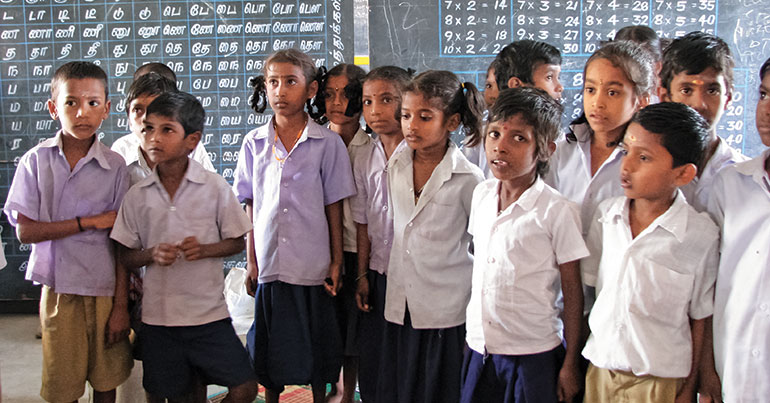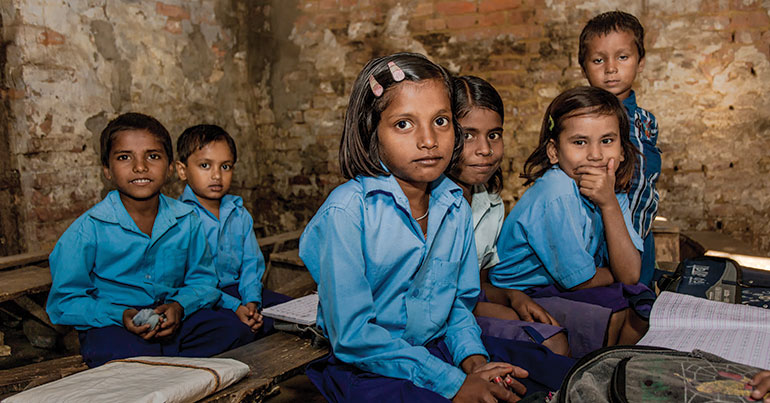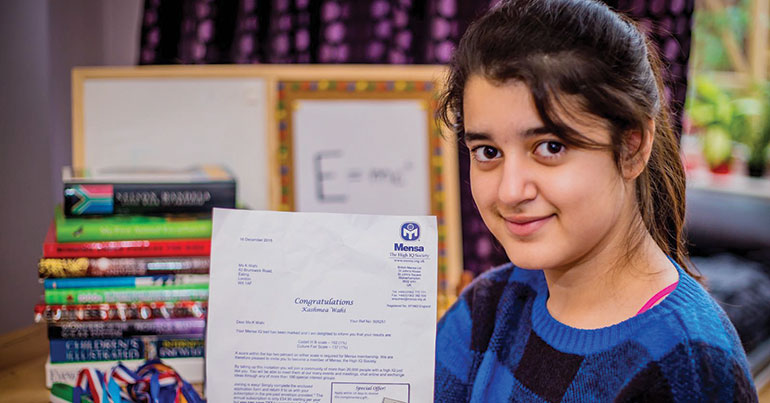Mensa, the association for highly gifted people, uses intelligence tests to search for miracle children in poor Indian neighbourhoods. The youngsters will later belong to the new elite of their country – as doctors, engineers or mathematicians

It’s afternoon, school has just ended and a girl, Ritu, climbs onto the roof of her house. In the distance, the metro rushes into the station and the glass buildings of international corporations glitter in the sun. Ritu is at home in the shadow of the towers: a small room without a bathroom, without running water, without daylight. The only window is painted over.
It’s a miserable place, and few would suspect that a genius would grow up here.
Ritu has an IQ of more than 140 (the average is about 100). She is one of the smartest children in the world.
This probably would never have occurred to anyone if the Indian Mensa Association had not discovered her. The global organisation for highly gifted people is currently looking for unknown geniuses in Ritu’s hometown of Gurugram (formerly Gurgaon) – for children who have above-average intelligence but whose abilities have not yet been recognised by anyone; whose families are poor but whose daughters and sons have the potential to later belong to the elite of their country.
There is Vishal, a math genius. He prefers to describe the world in numbers rather than in words (family income: $263). Or little Jyoti, who goes to a school without a roof. And the child prodigy Ritu, 13 years old, of whom the whole neighbourhood is proud. Tests have shown that all three are highly gifted, which means they have an IQ of 130 or higher.
But they live in a country where children’s intellectual gifts don’t often make a difference in their lives. Parents don’t have enough money to send them to private school. Or they may have to leave school early to work, or to get married young.

India has some of the region’s top schools, but also some of its worst. The country has produced four Nobel laureates and the heads of Microsoft and Google. But according to a recent education report, almost half of the third graders who attend a state school in the country can’t yet read.
It’s not hard to predict what would have happened to Ritu if no one had recognised her talent.
Humble beginnings
In front of the door of her family’s apartment, the girl takes off her shoes. The room is bathed in greenish light. Barefoot, Ritu walks across the cold stone floor. Here she eats, learns and sleeps next to four other people. In the evening, when the Paswan family extinguishes the only lamp, the father lies down in the only bed. Ritu and her mother curl up on the floor in front of it, her two brothers next to them.
In the morning, before Ritu goes to school, she pumps water from the well in the courtyard. Behind it are four toilets for 40 families. The rent for the apartment is the equivalent of $58. That is almost as much as Ritus’ mother earns as a domestic servant in a month.
Intelligence tests have an elitist reputation, but they do not distinguish between poor and rich, man or woman, high and low caste. Mensa uses a so-called matrix test. Language plays no role in it. In purely theoretical terms, a child does not even need to be able to read and write in order to perform well. The only thing that counts is cognitive ability.
The children are shown logical patterns, such as sequences of numbers or shapes, and are asked to complete the patterns. It’s a herculean test, and not even the top performers complete all the tasks. Ritu’s IQ of 140 means that she did better than 99% of all other participants.

Since the Mensa test, a lot has changed for Ritu. She has had a mentor at her side. She receives pocket money and was awarded a scholarship to a private school. Ritu proudly wears her school uniform: white trousers and a dark felt jacket bearing the name of the school, Vidya, Sanskrit for knowledge. Around 1,000 students attend Vidya, 40 students per class, from kindergarten to grade 12. There is a physics laboratory, a computer room and two libraries. It is bright and airy. Vidya is a great educational institution.
Ritu says she is trying hard to make her dream of becoming a doctor come true. Her dream was born of personal tragedy. One of her brothers became seriously ill at a young age. The doctor said he would recover on his own. Twenty-four hours later, the boy was dead. That’s why she wants to study medicine and then move away from here – to the village where her parents grew up “because the people there are even poorer than we are and don’t even have a hospital”.
It’s a remarkably mature sentiment for a 13-year-old. But most scholarship holders talk like that. They are children who do their homework in semi-darkness because their parents cannot pay the electricity bill. Ritu rolls out a blanket on the floor to study, using a stool as a desk. She studies for hours each night, knowing that a bad mark risks more than her scholarship. As her mother says, “Ritu is our only hope of getting out of here.”
But intellectual gifts alone are no guarantee of success. It takes hard work and a fierce determination to make it. Two scholarship holders are currently threatened with expulsion from the program. A high IQ makes many things easier: understanding complex issues, thinking in a clear and structured way. But intelligence, researchers like to say, is like a flower: If you take good care of it, it blossoms. But if you don’t, it withers.
“Education is expensive”
The morning is so cold that it hurts the fingers. A dozen children gather in a field where it looks as if a bomb has exploded. The city had a building demolished here, and the rubble that was once a house was left behind by the construction workers. The children hang their backpacks on the branches of a tree. Then they set to work.
They sweep the ground and cough in the dust. They roll out carpets to make a floor. They stretch tarpaulins for walls. Within half an hour, a school will be built on the edge of an unpaved road. A group of neighbours, most of them pensioners, teach children here as volunteers. The school day begins with mathematics, and it quickly becomes clear that the teacher means well, but division is not everyone’s strength. Maybe it wouldn’t be noticeable if it weren’t for one girl in the group who keeps pointing out mistakes to the teacher.
Jyoti has a big smile and two big holes in her socks. The 11-year-old has also qualified for a highly gifted scholarship, but so far has not been able to find a place in the private school because Mensa has not been able to find a donor for her. A school year at a better school costs the equivalent of $1,170. Mensa has supported 154 children, but the association has run out of donations. Jyoti’s mother works as a domestic servant, her father as a security guard. She would like to become a policewoman to catch criminals.
“Try hard, then you’ll be the main commissioner,” says Kishore Asthana, who is himself a clever man – the president of the Indian Mensa Association. Jyoti grins. It’s the first thing that changes: the belief in one’s own abilities. And at some point, the goals grow with it. It’s quite possible that Jyoti will later become an engineer and build space rockets.
“Nobody has ever told these children that they are smart,” says Asthana. And some are also unable to prove it: because they don’t have glasses and can’t read the blackboard; because they come to school hungry; because their mother is ill and they have to help out at home.
Around 2% of the world’s population is considered highly gifted. Applied to rural India, that percentage would equate to 6 million children. Asthana therefore sees the commitment less as a good deed than as a service to the nation: because every year the talent of hundreds of thousands diminishes, India today is not where it could be.

The difference that early support can make in a person’s development is also evident in the scholarship holders, who come from very different conditions.
Vishal Paudel is a boy with rough hair and many questions. He is 14 years old, only one year older than Ritu. They are both exceptionally smart, both are scholarship holders and both go to Vidya. Vishal’s family also lives in a too-small one-room apartment with only one bed. But there is a bathroom and two large windows through which sunlight falls. His big sister has painted pictures on the wall. His mother shows photo albums. On the cupboard are books by Stephen Hawking and comics about famous scientists.
In Ritus’ apartment there are two televisions, but not a single book. Vishal’s father gave his son a chessboard, which he had received as a gift at work. Vishal learned to play chess at the age of four. Today he is the schoolmaster of his state. At the age of 13, he won a robotics competition.
Ritu’s mother also tries as hard as she can. But her burden is too great for her to be able to lift it alone. Her two sons dropped out of school when their father abandoned the family years ago. Four months ago, he suddenly appeared in the doorway again.
Vishal’s father has four different jobs as a cook. He doesn’t have a high school diploma, but he reads the newspaper every morning, especially the business section; if he finds an article interesting, he cuts it out and files it. He dreams of his son becoming an engineer and his daughter an insurance saleswoman. And he does everything he can to make his wish come true.
[manual_related_posts]
He sent his son to kindergarten at just four years old – a year later than he would have liked to, he says, regretfully. “But education is expensive,” he says.
Ritu initially attended a school where the teacher sometimes didn’t show up for lessons. She was 11 years old when she was able to switch to Vidya thanks to Mensa. When she arrived there, she tormented herself. Classes are taught in English, as in most private schools in India. Ritu grew up with Hindi, so she didn’t understand a word.
Intelligence is partly innate. But what a person can make of it depends on external circumstances, on whether parents pay attention to their child, sing to him or read to him – and send him to a good school.
Eleven years is a long time in the development of a child. But even then, it is not too late to promote a highly gifted one.
Today, Ritu is one of the best in her class.
© 2018 Spiegel Online distributed by The New York Times Syndicate
This article was published in the October 2018 edition of Southeast Asia Globe magazine. For full access, subscribe here.

